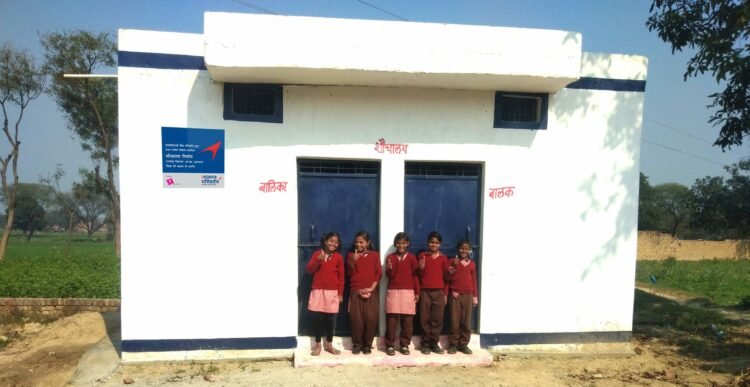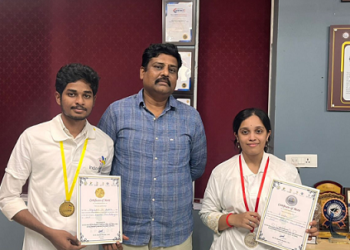It has long been recognized that investments in school sanitation and hygiene can create improved learning environments, thereby facilitating increased attendance and retention of students. The impact is most pronounced among girl students, when their special needs of adequacy and privacy are catered to. According to Modi govt data, Uttar Pradesh has the lowest age specific attendance ratio of 22.7% for girls at the pre-primary level and 64.5% at the level of class 11 and 12.
Adding to this grim reality, in a report released by the government think-tank Niti Aayog on “School Education Quality Index”, Uttar Pradesh finished last with an overall performance score of 36.4 per cent. Although low attendance, low learning levels of children and their poor health condition is rampant across whole of Uttar Pradesh, but the scenario for girls is more disastrous. It is important to recognize and distinguish between the needs of girls and boys, of children of different age groups and the special needs of the physically challenged. This striking void was majorly because of lethargic infrastructure and lack of basic amenities like access to toilets and water in schools.
Taking cognizant of these gaps and understanding the fact that water, sanitation and hygiene (WASH) in schools ensures conferring benefits related to improved school attendance and performance, health, and gender equality and hence a better future for the nation, AROH Foundation, a leading national level NGO started off with a Holistic School Sanitation Drive in association with HDFC Bank’s CSR Initiative PARIVARTAN, to provide child-friendly, gender-friendly toilets with 24×7 water supply and drainage, hand washing facilities along with all-weather drinking water facilities in 34 government schools in 3 districts, namely Badaun, Bulandshahr and Firozabad of Uttar Pradesh.
An extensive behavioral training programme was taken up in campaign mode to create awareness about hygiene and sanitation and to embed a long lasting behavioural change in the school children. Formation of Swacchta Committee (Hygiene committee) for fostering hygiene, plantation and environment supportive drives were also inculcated in the program and awareness camps and importance of WASH activities has been taken hand in hand in order to ensure a sustainable sanitation habits as an ‘approach to life’.
Soni Kumari suffered from stomach pain and dizziness. At times, it was so severe, that she had to take leave from school. Soni studies in Upper Primary School, Dikhtauli, Firozabad, Uttar Pradesh and this happened with her every time she had to hold herself from going to toilet. She was not the only one with this particular set of problems. The cause of her illness was not food poisoning or a virus. It stemmed from the lack of a toilet at her school.
The school was taken under the intervention and a toilet with running water facility was constructed in the school. The story of change is narrated by Soni, “When we had to relieve ourselves, we wouldn’t go because we were afraid the boys would follow us,” the slight girl says. “They would stand there and watch us. Our stomachs would start hurting because we wouldn’t go. Then we wouldn’t feel well so we would take the rest of the day off from school. But look now, we 175 girls have separate toilet. It has running water, dustbins and also a water cooler. Sometimes, when we are on our monthly cycles, we prefer coming to schools, as we get clean toilets and clean water here. We don’t break our attendance also. It’s a win-win situation now”
Not just the students but female teachers and even female principal were also going through same turmoil, as Rajeshwari Sharma, Principal, Primary and Upper Primary School in Jatwai village says, “Even as a principal/ teachers, we didn’t drink water during the day because we didn’t want to need the toilet,” she said with an apologetic smile. She remembers her female students sometimes having difficulty paying attention during class because they were dehydrated.
Fewer older girls attended school, which Rajeshwari Sharma attributes to the fact that they had no place in school to change their sanitary napkins. “Not just the girls, open defecation was causing a lot of serious health issues with the male students and male teachers of the school too. But the scenario is changed! Thanks to HDFC Bank and AROH Foundation team. We have such a well-built toilet in school, separately for boys and girls and water facility for washing and drinking is ensured too. It is such a relief for children and staff both! You won’t know but it’s a relief!”
The project has taken gigantic strides towards its ambitious targets of facilitating 4457 school children (including 2116 boys and 2341 girls) and around 135 school staff with 16 safe drinking water units, 16 school sanitation units and strategic thought process towards healthy and hygienic lifestyle. Some of the tangible achievement, which is marked as milestones, includes improvement in retention and attendance of students, especially girls by around 8-9%, better learning outcomes and teaching leaning Eco systems due to relived & zealous teacher and students. Water, sanitation and hygiene facilities in schools created an enabling environment which secures children’s dignity, safety, health and attendance in classes, thereby securing the future of children and the nation.
The school children have been carrying the messages far beyond the school walls, bringing lasting improvement to community hygienic practices. The project also envisages contributing to the National Mission of Swachh Bharat Abhiyan and Swachh Vidyalaya Abhiyan. A beginning has already been made in bringing into focus all the nodal ministries and departments together to tackle the goal of providing sanitation facilities in all the schools hence ensuring a bright and healthy future for the nation.





















